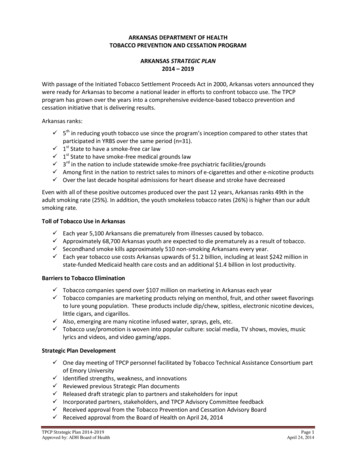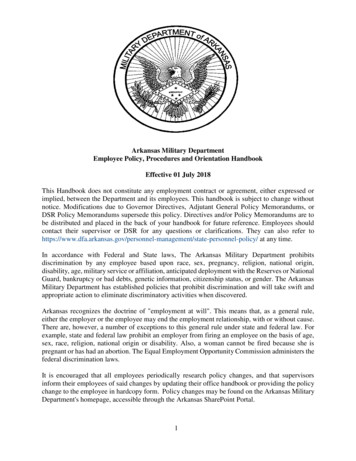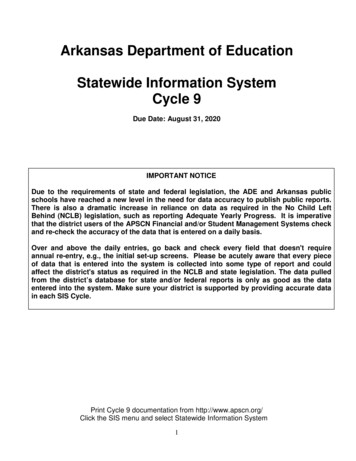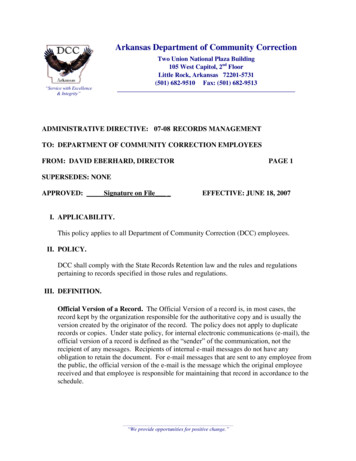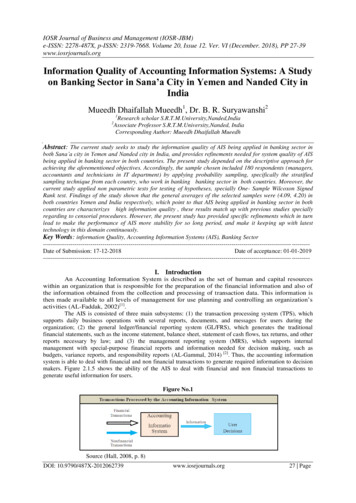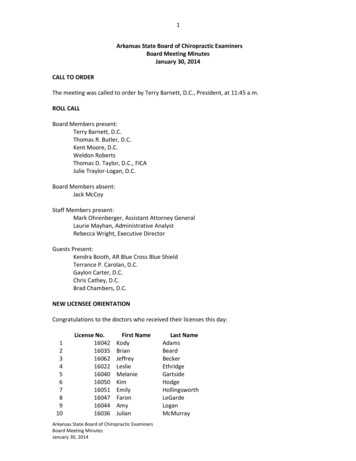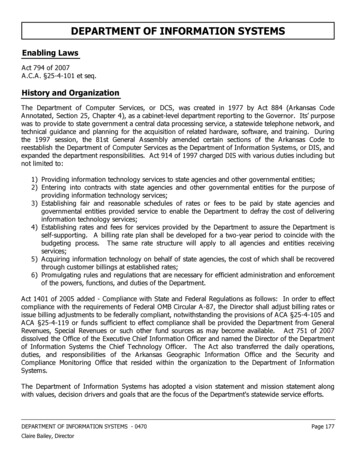
Transcription
DEPARTMENT OF INFORMATION SYSTEMSEnabling LawsAct 794 of 2007A.C.A. §25-4-101 et seq.History and OrganizationThe Department of Computer Services, or DCS, was created in 1977 by Act 884 (Arkansas CodeAnnotated, Section 25, Chapter 4), as a cabinet-level department reporting to the Governor. Its’ purposewas to provide to state government a central data processing service, a statewide telephone network, andtechnical guidance and planning for the acquisition of related hardware, software, and training. Duringthe 1997 session, the 81st General Assembly amended certain sections of the Arkansas Code toreestablish the Department of Computer Services as the Department of Information Systems, or DIS, andexpanded the department responsibilities. Act 914 of 1997 charged DIS with various duties including butnot limited to:1) Providing information technology services to state agencies and other governmental entities;2) Entering into contracts with state agencies and other governmental entities for the purpose ofproviding information technology services;3) Establishing fair and reasonable schedules of rates or fees to be paid by state agencies andgovernmental entities provided service to enable the Department to defray the cost of deliveringinformation technology services;4) Establishing rates and fees for services provided by the Department to assure the Department isself-supporting. A billing rate plan shall be developed for a two-year period to coincide with thebudgeting process. The same rate structure will apply to all agencies and entities receivingservices;5) Acquiring information technology on behalf of state agencies, the cost of which shall be recoveredthrough customer billings at established rates;6) Promulgating rules and regulations that are necessary for efficient administration and enforcementof the powers, functions, and duties of the Department.Act 1401 of 2005 added - Compliance with State and Federal Regulations as follows: In order to effectcompliance with the requirements of Federal OMB Circular A-87, the Director shall adjust billing rates orissue billing adjustments to be federally compliant, notwithstanding the provisions of ACA §25-4-105 andACA §25-4-119 or funds sufficient to effect compliance shall be provided the Department from GeneralRevenues, Special Revenues or such other fund sources as may become available. Act 751 of 2007dissolved the Office of the Executive Chief Information Officer and named the Director of the Departmentof Information Systems the Chief Technology Officer. The Act also transferred the daily operations,duties, and responsibilities of the Arkansas Geographic Information Office and the Security andCompliance Monitoring Office that resided within the organization to the Department of InformationSystems.The Department of Information Systems has adopted a vision statement and mission statement alongwith values, decision drivers and goals that are the focus of the Department's statewide service efforts.DEPARTMENT OF INFORMATION SYSTEMS - 0470Claire Bailey, DirectorPage 177
Our Vision - Customer satisfaction every timeOur Mission - Provide technology leadership and solutions to assist our customers in their delivery ofpublic services.Values - Integrity, Customer Focus, Teamwork, Communication, Innovation, Credibility, ContinuousImprovement.Decision Drivers - People - Cost - Reliability - SecurityGoals - Operational Excellence, Financial Excellence, Technology Leadership.DIS is organized to accomplish its mission through 8 primary teams:1)2)3)4)5)6)7)8)The Director's OfficeChief Operations OfficeArkansas Geographic Information OfficeCustomer Relationship Management OfficeArkansas Wireless Information Network Program OfficeProject and Enterprise Program Management OfficeChief Financial OfficeState Security OfficeThe Director's Office is the Administrative Division of DIS. It includes the Deputy Director, EnterpriseProgram Manager, General Counsel and support staff. This Division provides overall guidance for theAgency and works directly with the Executive Leadership Team and the legislature. The Human ResourceDivision (HR) also resides under the leadership of this office. HR plans and implements human resourcepolicies in accordance with DIS guidelines, DFA-Office of Personnel Management, and FederalEmployment Labor Laws. This Division administers payroll, job classification / compensation,employment/recruiting, training, employee benefits enrollment, and general personnel policies.The Chief Operations Office includes the following Sections:Enterprise Systems Management (ESM) Division is responsible for designing, implementing, andmaintaining solutions to meet customers’ hosting requirements on Mainframe, UNIX, and Windows serverplatforms, as well as end user support and database administration. The Exchange E-mail Hostingsection hosts approximately 18,000 Microsoft Exchange e-mail accounts. DIS security efforts result in therejection and/or quarantine of an estimated 710,000 spam e-mails daily and provide twenty-four hours aday, seven days a week monitoring, system support and on-call phone support to ensure maximumreliability for our customers. Systems hosting has more than 100 state-wide applications, such as thedrivers’ license system, state tax systems, state-wide accounting, criminal justice, welfare eligibility, childprotection, and numerous other public service applications. The applications are hosted on a vast arrayof Mainframe, UNIX, Linux and Windows operating systems and are maintained in the DIS Data Center.The Database Administration in ESM provides services to many applications hosted by DIS. The servicesinclude installation, maintenance, operations, monitoring, tuning, and backup/recovery of the manydatabase management systems in use by the State of Arkansas’ applications. Disk Storage in ESMmanages more than 25 Terabytes of Enterprise Disk Storage for the systems hosted at DIS. This serviceprovides robust, flexible, highly available, and cost effective disk storage to support continuousoperations for the state’s critical workloads.DEPARTMENT OF INFORMATION SYSTEMS - 0470Claire Bailey, DirectorPage 178
Enterprise Network Services provides and manages the State voice, data, video, and wireless networks,including Internet access and state-wide network connectivity to state agencies, boards, commissionsconstitutional offices, K-12 education, and higher education institutions. The division also assistscustomers in accomplishing their technology goals through network engineering, provisioning, andoperations. The Enterprise Network Services Division manages 1,940 network edge devices or routers,utilizing more than 2,700 circuits. Internet bandwidth capacity provided at the DIS Data Center hasgrown from 45 Mbps (millions of bits per second) in 1997 to 1,335 Mbps distributed over three Points ofPresence. The State data network has doubled approximately every 18 months over the past 12 years.The data network also provides 10 internet content filtering servers which block about 8,000 sites persecond. The Enterprise Network Services group provides operational support twenty-four hours a day,three hundred sixty five days a year to ensure uninterrupted services to state agencies, and the citizens ofArkansas. The Division also provides solutions that comply and support the business and programpriorities for state government. It establishes open and common frameworks and processes to enablestatewide information sharing and interoperability of services.Enterprise Services provides Application Management, Data Warehouse, and document imaging servicesto customers. Application Management supports the state drivers’ license system, interfacing with theDepartment of Finance and Administration (DFA), Arkansas State Police (ASP), Arkansas CrimeInformation Center (ACIC), the Office of Child Support Enforcement, and the Administrative Office of theCourts. The division manages applications in support of individual, corporate, withholding, and sales taxsystems. Other applications supported by the division include the Arkansas Public Employees RetirementSystem (APERS), the Arkansas State Police License Administration System, which tracks 26 licenses andregistration such as concealed handgun, fireworks, private business, and commissioned security officer,and the Arkansas Public Licensure System for the Arkansas Department of Education (ADE). TheDivision also supports the DIS Customer Notification System (CNS) which provides information tocustomers.The applications group implemented the Wage Reporting System (WRS)/EmployerRegistration System (ERS) application for the Department of Workforce Services (DWS) in FY2007. Morethan 1,300 employers used the ERS application to register their company with DWS, and an average of2,000 employers use the WRS application to upload employee wages to DWS and make unemploymentinsurance payments on-line. The Data Warehouse Section provides archiving and analysis of historicaldata, which supplies valuable information to business decision makers. Primary customers are theDepartment of Finance and Administration (DFA), Department of Human Services (DHS) and theDepartment of Workforce Services (DWS). The division also develops and manages systems that providefor capture, storage, security, revision control, retrieval, and presentation of electronic documents.Enterprise Operations Division provides DIS customers a high-reliability Operations Center, customerservice desk, and customer field support services. They are responsible for a 12,800sq. ft. secure,environmentally controlled, raised floor environment that houses critical technology assets, such as anAWIN Smart Zone controller, mainframe and server computers, centralized disk storage, network routingequipment, security monitoring data back-up tape systems, AC power protection, gas fire suppressionsystem, under-floor and ceiling water leak detection, emergency generator, off-site vaulted tape backupstorage, and disaster cold site capability. The Operations Center performs more than 2,000 mainframeand server-based data processing jobs per day. The division also operates and monitors AWIN, thestate’s first responder system, state network and computer systems 24 hours a day, every day of theyear. The division is responsible for the print production which averages 1.5 million pages per month.The Customer Service Desk (Call Center) is staffed by nine agents who receive and work 115,000 state,city, and local government customer trouble calls and e-mails. The agents create and manage 67,000service tickets per year using the Help Desk Expert Automation Tool (HEAT) specialized tracking softwareand resolve 36,000 tickets per year without referral to technical services. The call center also houses theDEPARTMENT OF INFORMATION SYSTEMS - 0470Claire Bailey, DirectorPage 179
State Operators who assist Arkansas citizens with 48,000 telephone number inquiries each year. TheField Support Team provides desktop, server, and local area network support for K-12 education, as wellas other DIS customers as needed. Nine remote and five central office technicians serve 263 ArkansasPublic School Computer Network (APSCN) customers.Technical training workshops for schooltechnology coordinators are offered at local educational cooperatives and Little Rock. DIS also providesprecinct-level support to county election officials as coordinated through the Secretary of State’s Office.The Field Support group plays a key role in DIS disaster response technical support. Examples includethe February 5th tornado with technical support responses in Atkins, Clinton, Mountain View andGassville.The Arkansas Geographic Information Office (AGIO) was created to educate the public and toprovide information regarding land and mapping data resources to various entities throughout the state.The AGIO coordinates state and federal geospatial data projects across Arkansas. The office works inconjunction with the Arkansas State Land Information Board (ASLIB). The passage of ACT 751 of 2007moved the AGIO under the Arkansas Department of Information Systems. The Office operates GeoStor,the state's geographic information systems clearinghouse, where the state's Geographic InformationSystem (GIS) data is published for use. The Office works closely with County Assessors in support of theCounty Assessor Mapping Program, County Judges and E9-1-1 Coordinators in support of the ArkansasCenterline File Program and with County Floodplain Managers in support of FEMA's Flood mapModernization Program.The Office is also responsible for maintaining the Arkansas DigitalOrthophotography Program that procures aerial imagery of the state.Customer Relationship Management Office provides customer service representatives, who serveas a liaison between DIS and assigned customer base. The account representatives evaluate thetechnology needs of our customers and present solutions.They also coordinate with internaldepartments to present solutions and complete projects, provide product demonstrations andpresentations, and promote DIS products and services to ensure buying power for the state. The teamalso coordinates technology upgrades and conversions for state agencies, boards, and commissions.This area also includes the following;Billing Section - DIS operates as an Internal Service Fund providing telecommunications and dataprocessing services to state agencies and other approved governmental entities on a fee-for-service basis.As prescribed in both State and Federal laws and guidelines, DIS is required to operate at or near zeroprofit. DIS recovers all expended cost by billing clients for service usage.Vendor Invoice Reconciliation allows DIS to manage our expensed dollars versus dollars billed. Thisgroup tracks invoice details to authorized contract rate elements in order to validate service rendered.Communications Section provides leadership in the Agency’s efforts in planning and conducting internaland external communications. The team utilizes printed and electronic correspondence and newsletters,as well as audio and video presentations. The team is also responsible for communications efforts forprograms such as the Arkansas Wireless Information Network (AWIN), state video network (VNET) andthe state’s participation in the E-Rate program. The division is directly responsible for the agency incommunication with the administration, legislators, customers, taxpayers, media and other keystakeholders.The Contract Section is responsible for processing all contract related documentation and managing allcontract processes. This includes RFP, IFB, RFQ awards and renewals, as well as maintenance contracts,leases, or inter-agency agreements. The Contract Section reviews all vendor contracts for complianceDEPARTMENT OF INFORMATION SYSTEMS - 0470Claire Bailey, DirectorPage 180
with Arkansas Law and works with the Office of State Procurement, vendors, and internal stakeholders toassure a valid contract agreement is in place at all times.Project & Enterprise Program Management Office (PEPMO) provides project managementservices for internal and external projects, as well as for multi-agency and state-wide projects andprograms. PEPMO services are the management of project schedules, progress reports, life-cycledevelopment, risk and resource management, cost and budget control, and change management. DISproject managers utilize a consistent approach based on internationally accepted methods, techniques,and best practices defined by the Project Management Institute.In addition to project and program management, PEPMO includes:Quality Management who is responsible for the agency quality program, which is built around theMalcolm Baldridge National Quality Award criteria and has Arkansas Institute of Performance Excellence(AIPE) examiners on staff. Quality efforts also include the Customer Feedback System. DIS has twiceearned the AIPE Commitment Award (2003, 2004) and twice earned the AIPE Achievement Award(2005, 2006).Strategic Funding - E-RATE Program - This program provides discounts to assist schools and librariesobtain affordable telecommunications and internet access. It is one of the support programs fundedthrough the Universal Service fee which is charged to companies that provide interstatetelecommunications services. Through these efforts, state entities have received several million dollarsthrough the participation in this program. The team also assists state efforts in the Rural Health CareProgram.Arkansas Wireless Information Network Program Office (AWIN) provides a statewide trunkbased interoperable communications system to support the public safety/service users in Arkansas on adaily basis as well as in times of emergencies that are multi-jurisdictional or multi-disciplinary. Theprimary focus is to provide cost efficient/well maintained data, voice, wireless, and video services to ourcustomers including technical stability, application of converged technology, timely response tocustomer’s needs and in general creating customer satisfaction.AWIN currently serves more than13,000 public safety personnel across the state. More than 100 tower sites provide a state-wide networkthat allows users in any part of the state to communicate in time of emergencies. The AWIN teamprovides system management, including engineering support for system monitoring, engineering designand analysis for new projects, and 24 hours a day, 365 days a year system support, monitoring, and oncall phone support. Support of the system includes monitoring of the digital trunked system, monitoringand control of the microwave backbone, monitoring site environmental alarms, monitoring sites andchannels, and the monitoring of radios and talk groups. The team also provides coordination with theAssociation of Public Safety Communications Officials (APCO) to ensure proper frequency licensing.The Chief Financial Office is responsible for the Fiscal Administration Division who plans, develops,implements policy, and provides for the overall management of DIS budgeting, funds management,financial activities, cost recovery, and special projects. These are the daily operational programs thatenable the Department to run effectively and efficiently. The Financial Operations group providesaccounts payable and receivable activities; Information Technology Asset Management (ITAM) grouptracks the Department's assets.The State Security Office offers security solutions to ensure the protection of the state network andassist DIS employees, customers, and state and local agencies in developing business and disasterDEPARTMENT OF INFORMATION SYSTEMS - 0470Claire Bailey, DirectorPage 181
recovery plans. The state Security team monitors, protects, and performs vulnerability assessments forDIS hosted services by providing security monitoring of the state-wide network, including the operationand maintenance of 900 firewalls on the network. These efforts result in the denial of 10 millionmalicious attempts through the network firewalls daily. The network Monitoring, Analysis, and ReportingSystem (MARS) deployed into production in 2006, sends approximately 1,500 alerts of possible threatson the network daily.The Continuity of Operations Team of professionals is also a part of the Security Office. Primaryfunctions include planning and coordination of the development, implementation, testing, andmaintenance of Continuity of Operations plans, Pandemic Flu plans and preparation for any majorinterruption of DIS services and operations. The Continuity of Operations plans include dedicated staff,bi-annual testing and maintenance of systems and processes which include an off-site recovery facility.This division also provides training and tools to agencies and counties to develop continuity plans.Agency CommentaryThe Department of Information Systems (DIS) continues to pursue its leadership role in bringingArkansas agencies and institutions of stat
The Customer Service Desk (Call Center) is staffed by nine agents who receive and work 115,000 state, city, and local government customer trouble calls and e-mails. The agents create and manage 67,000 service tickets per year usin
